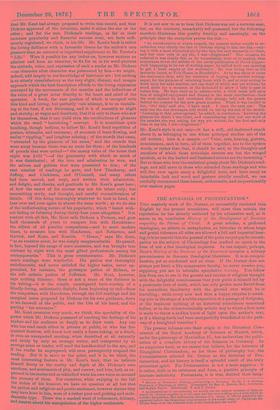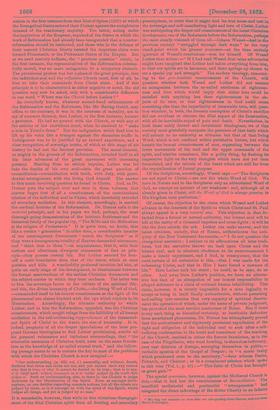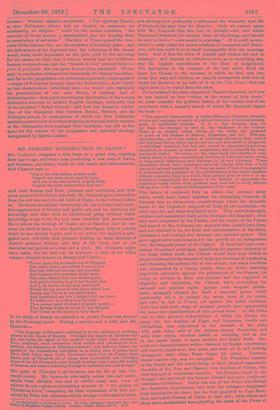THE APOLOGIA OF PROTESTANTISM.*
Tins masterly work of Dr. Dorner, so successfully rendered into' English by the present translators, will more than sustain the reputation he has already achieved by his exhaustive and, as it seems to us, conclusive History of the Development of Doctrine respecting the Person of Christ. A great scholar, a profound theologian, an athlete in metaphysics, an historian in whose large- and genial tolerance all aides are allowed a full and impartial hear- ing, it is no marvel that the perusal of his quite encyclopaedic investi- gation on the subject of Christology has marked an epoch in the lives of not a few theological inquirers. In one respect, perhaps, Baur's History of the Doctrine of the Atonement occupies a solitary pre-eminence in German theological literature. It is so compre- hensive, yet so condensed and so clear. If Dr. Dorner does not• always put forth a like compressive faculty, he never wearies you,. supposing you are in tolerable speculative training. You follow• him from era to era in the genesis and exodus of religious thought with the delightful consciousness that your guide is himself led by a passionate love of troth, which has only grown more fervid from- his marvellous familiarity with the ground over which be is travelling ; while every now and then a happy surprise is await- ing you in the shape of a subtle exposition of a passage of Scripture, or the luminous uprising of an historical coincidence unnoticed before, or in the characteristically artistic way in which a foot.note is made to throw a sudden burst of light upon the author's text, as if a blazing torch had been unexpectedly brandished in the path-• way of a benighted traveller.f
The present volumes owe their origin to the Historical Com- mission of the Royal Academy of Sciences at Munich, which, under the patronage of Maximilian IL, has undertaken the publi-
cation of a complete history of the Sciences in Germany. In
an auspicious hour, as we cannot but believe, for the interests of Evangelical Christendom, as for those of philosophy too, the- Commissioners selected Dr. Dorner as the historian of Pro- testantism, and his history is itself a Splendid result of the truly protestant spirit. For Protestantism is not a mere negation : it is rather, both in its substance and form, a positive principle of intrinsic catholicity. Protestants, it is true, derived their desig-
• History of Protestant Theology, particularly in Germany. By Dr. J. A. Darner, Professor of Theology at Berlin. Translated by Rev. G. Robson, M.A., Inverness, and Sophia Taylor. Edinburgh: T. and T. Clarke.
t As illustrations of our meaning, we would cite the unique estimate of Spinoza which Dr. Dorner supplies in a foot-note. and the very striking proof with which he tortillas his position, that millennium dreams of a coming of Christ gradually die- appftred before the deepening consciousness of the actual reign of Christ as the. Divine Son—over the fortunes both of thb Church and the world.
;nation in the first instance from that Diet of Spires (1529) at which the Evangelical States entered their Protest against the unrighteous demand of the reactionary majority. The latter, acting under the inspiration of the Emperor, required of the States in which the work of Reformation had already been inaugurated that a counter- reformation should be instituted, and those who in the defence of their nascent Christian liberty resisted the imperious claim were termed Protestants, or the Protestant States of the Empire. But as we need scarcely indicate, the " previous question " which, in the first instance, the representativei of the Reformation substan- tially moved, was no mere antagonism to a temporary obstacle. The provisional protest was but a phase of the great principle, that the individual soul and the collective Church must, first of all, be free to take their commands from Christ alone. And if this principle is to be characterised as either negative or novel, the old question may now be asked, only with a considerable difference in one word, " Where was the Church before Lather ? "
As everybody knows, whatever second-hand calumniators of the Reformation and the Reformers, like Mr. Baring-Gould, may affirm to the contrary, it was in the interests of morality, not to say of common decency, that Luther, in the first instance, became a protester. He had no quarrel with the Church, or with any of
the articles of her exorbitant creed, when he resolved to " make a hole in Tetzel's drum." But the indignation which fired him to lift up his voice like a trumpet against the shameless traffic in
Indulgences was to be justified by an inward experience, and a clear recognition of sovereign truths, of which at this stage of his history he had not the faintest prevision. The moral element, so mighty in the genesis of the Reformation, revealed itself in all the later advances of the great movement with increasing potency. Starting from an ethical impulse, Luther was led ;into the depths of his own soul—into the great question of reconciliation—reconciliation with truth, with duty, with provi- dential arrangement, with the living God himself. The answer to this much-involving question he found in Christ. And, as Dr.
Dorner puts the subject over and over in these volumes, that -answer begot first of all a consciousness of the constitutional relation of the individual soul to Christ, which inevitably extruded all secondary mediation. In this element, accordingly, is centred the cardinal doctrine of the Reformation. Dr. Dorner calla it the 2naterial principle, and in his pages we find, perhaps, the most thorough-going demonstration of the intrinsic feebleness and the historical falsity of the popular cry, "The Bible and the Bible alone is the religion of Protestants." It is quite true, no doubt, that like a certain " generation " in olden time, a considerable number of our contemporary Protestants " search the Scriptures " as if they were a homogeneous totality of Heaven-descended utterances, -and "think that in them "—in acquaintance, that is, with their various and oftentimes divergent statements of fact or prin- ciple—they possess eternal life. But Luther secured for him- self a sneer foundation than that of the latter, which at once perishes and kills. A wonderfully profound intuition led him, at quite an early stage of his development, to discriminate between the formal asseverations of the earliest Christian documents and the subject-matter to which they bear evidence. The latter was to him the sovereign factor in the culture of the spiritual life ; and this, the divine humanity of Christ,—the living Word of God, —commended itself to his inmost consciousness as the light of the phenomenal sun claims kindred with the eye which rejoices in its illumination. Accordingly, the ultimate authority to which Luther, and in him the Reformation, appealed, was the Christian • consciousness, which sought refuge from the fallibility of all human .mediation in the self-evidencing rapprochement of the transcend- ent Spirit of Christ to the wants, the sins of humanity.. It is, indeed, prophetic of all the deeper speculations of the later pro- posed German theologians to find Luther proclaiming, amidst all his personal vehemence and turbulent surroundings, that " the attainable assurance of Christian truth rests on the same founda- tion as the knowledge of so-called eternal truth," and the follow- ing passage seems to us to contain the key to most of the problems with which the Christian Church is now occupied :—
" Oar understanding (p. 235, vol. i.) assuredly, and without deceit, declares that three and seven are ten, and yet cannot show any reason why that is true, or why it cannot be denied to be true ; that is to say, it is itself made subject, inasmuch as it is rather judged by the truth than judges it. Such an understanding, also, is there in the Church to judge doctrines by the illumination of the Spirit. Even as amongst philo- sophers, no one decides regarding common notions, but all the others are judged by these, so is it amongst us with the mind of the. Spirit, which judges all things, and yet is judged by no man."
it is remarkable, however, that while in this victorious disengage- ment of the filial Christian spirit from all fretting and secondary ; prescriptions, in order that it might find its true home and rest in the sovereign and self-manifesting light and love of Christ, Luther was anticipating the deeper self -consciousness of the latest Christian development, one of the Reformers before the Reformation, perhaps the most clearly-visioned of them all—Johann Weasel—had in the previous century "struggled through dark ways" to the very stand-point which his greater successor—at the time entirely ignorant of Wessel's conclusions—won for himself. Of Weasel Luther thus writes :—" If I had read Weasel first mine adversaries might have imagined that Luther had taken everything from him, so that our spirits are in harmony, and there springs up thence to me a special joy and strength." The modern theology, remount- ing to the pre-Anselmic consciousness of the Church, will question whether both Weasel and Luther did not assume an antagonism between the ao-called attributes of righteous- nese and love which would imply that either love could be satisfied with anything less than righteousness in the ob- jects of its care, or that righteousness in God could mean something else than the impartiality of inexorable love, will ques- tion whether, in both, the forensic conception of Christ's sacrifice did not overbear or obscure the filial aspect of the Incarnation, with all its inevitable sequel of pain and death. Nevertheless, in both these nobly devout and intuitional theologians, we of this century must gratefully recognise the presence of that faith which will submit to no authority as ultimate but that of that living Word, which is not confined within perishable letters, but which haunts the inmost consciousness of man, separating between the lower movements of the soul and the upper commands of the spirit, and startles conscience, like a guilty thing, by flashing its imperative light on the very thoughts which have not yet been formulated, and the intents of the heart which are still far from the crystallisation of formal purpose.
Of the Scriptures, accordingly, Wessel says :—" The Scriptures are not equal to Christ,—are not the whole Word of God. We have in Nature and in the Scriptures only an abbreviated Word of God, an excerpt on account of our weakness ! and, although all is already given in Christ, still the Word of God is always growing in His kingdom unto perfection."
Of course, the objection to the claim which Wessel and Luther advance in the interests of the Spirit to which Christ and St. Paul always appeal is a very natural one. This objection is, that de- tached from a formal or normal authority, the human soul will be left at the mercy of a thousand impulses and cross-lights ; it will be like the dove outside the ark. Luther can make answer, and the latest criticism, namely, that of Renan, authenticates the anti- quity of the New Testament documents,—" I do not question the evangelical narrative ; I subject to its affirmations all later tradi- tions, but the narrative throws me back upon Christ and the human soul, and in absolute obedience to its announcements I make a lonely experiment, and I find, in consequence, that the most certain of all certainties is this,—that I was made for the redeeming Christ, and that in Him I have found a newness of life." Here Luther took his stand ; he could, as he says, do no other. And away from Luther's position, we have no alterna- tive but that of an abnegation of our inmost responsibility in alleged deference to a claim of external human infallibility. This claim, however, it is utterly impossible for a man logically to accept as being in itself finally authoritative, without possessing and calling into exercise that very capacity of spiritual discern- ment the operation of which, under the name of private judgment, has provoked the most terrible anathemas of Rome. But if there is any such thing as historical certainty, as inevitable deduction from ascertained phenomena, Dr. Dorner has triumphantly proved that the authoritative and rigorously persistent repudiation of the right and obligation of the individual soul to seek after a self- sufficing confirmation in the heart and conscience of the teaching of the Church, resulted in either the fiercest fanaticism, as in the case of the Flagellants, who went howling, in shameless indecency, over vast districts of Europe, scourging themselves in public,— veritable apostles of the Gospel of Despair ; in " a moral laxity which penetrated even to the sanctuary,"—bear witness Dante, Petrarch, and Chaticer ; or in a complacent atheism which spoke in this wise (Vol. i., p. 49) : —" This fable of Christ has brought us great gain."* The special gravamen, however, against the Mediaeval Church is this,—that it had lost the consciousness of Reconciliation. The manifold mediatorial and penitential " arrangements " had relegated the direct infiowings of the divine Charity to an infinite
* We beg our readers to note that we are quoting from Dorner, and not from Merle D'Aubignt.
distance. Dualism reigned everywhere. "The spiritual Courts, as even Bellarmine, allows, had no charity, no reverence, no scholarship, no religion ; " while for the secular outsiders, " the economy of Grace became a systematised plan for keeping them in uncertainty of salvation." The Key of Peter opened the trea- sures
of the nations, but not the treasures of heavenly peace ; and the deliverance of the departed from the inflictions of the unseen world, being made dependent on the price paid by the surviving for the masses for their sins, it was no wonder that the indifferent became contemptuous, and the " friends of God" uttered their sus- piria de profundis. But our space is more than exhausted. We can only, in conclusion, indicate how luminously Dr. Dorner has deline- ated for us the progressive—or sometimes, apparently, improgressi ve —stages of European thought since the Reformation ; how vividly he has characterised individual men—we would note especially his presentations of our own Bacon, of Lessing, and of Schleiermacher—how justly he estimates the function of the various distinctive elements in modern English theology, eminently that of the so-called " Broad Church," and how his dramatic exhibi- tion of the triangular duel between Renan, Strauss, and the Tubingen school, in consequence of which the New Testament narratives survive for us in their integrity, as the inalienable outcome of the internecine feud amongst their assailants, has left us free space for the culture of the progressive and spiritual theology inaugurated by Martin Luther.




































 Previous page
Previous page